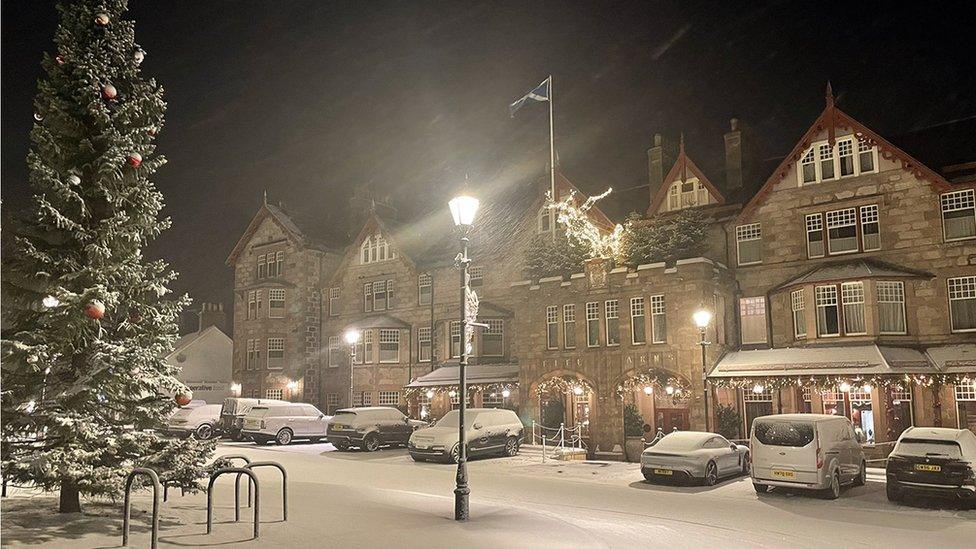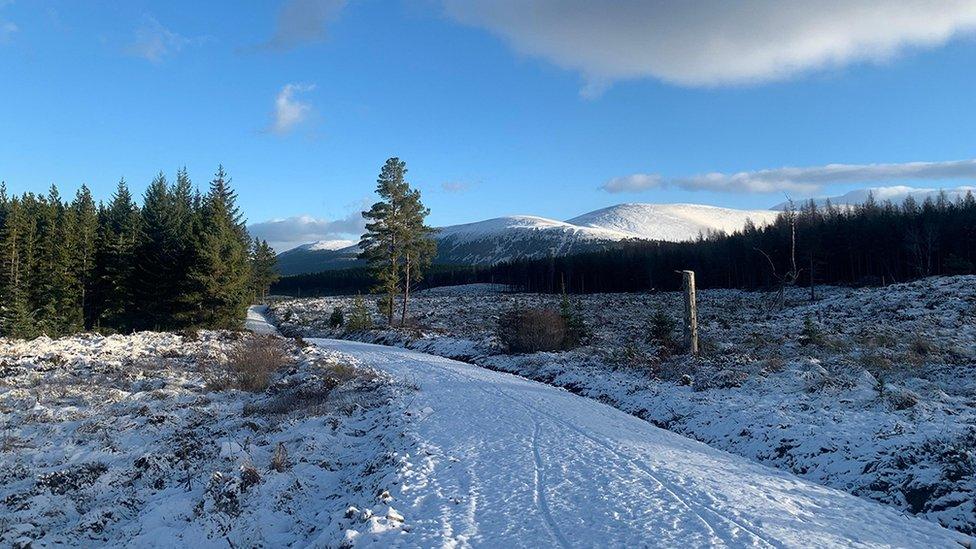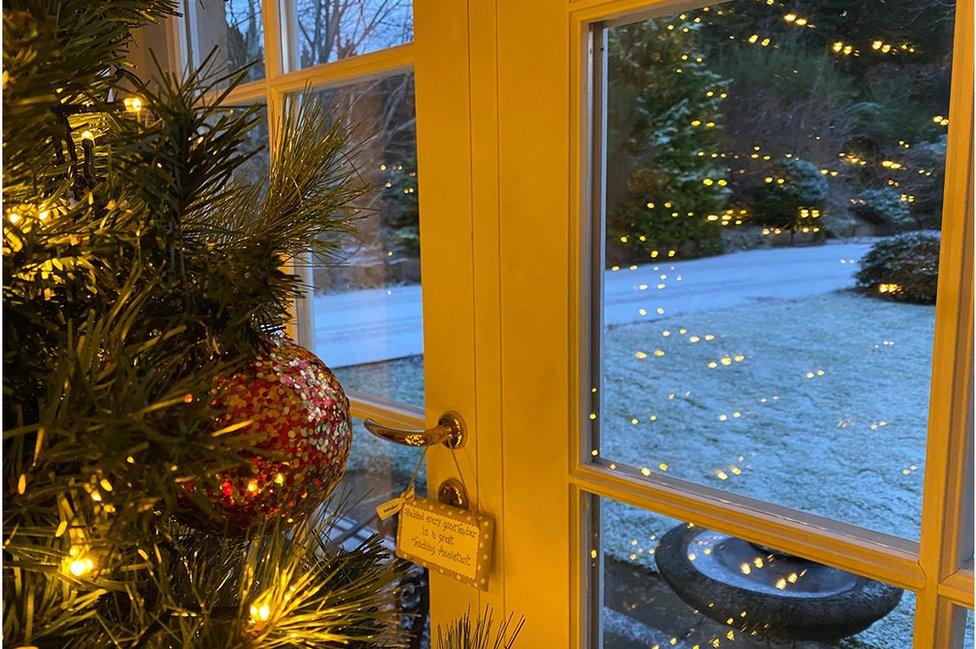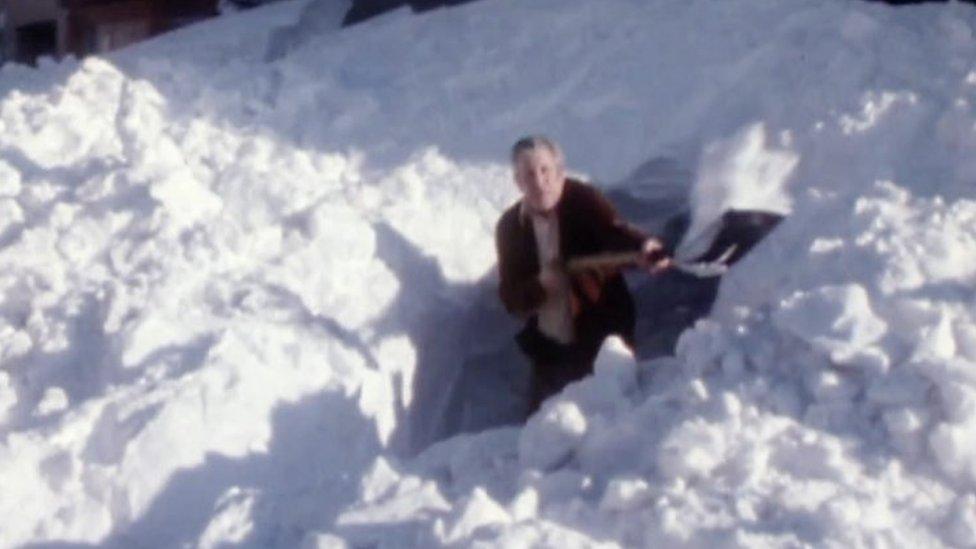Met Office confirms white Christmas as snow falls in Scotland
- Published

Braemar woke up to a good covering of snow
It's officially a white Christmas, according to the Met Office.
Reports of snow have been confirmed in Braemar and Aboyne in Aberdeenshire, Strathallan in Perthshire and across Shetland.
Traffic camera footage also revealed snow or sleet fell across the Yorkshire Dales in England.
The Met Office defines a white Christmas as when one snowflake is observed to fall in the 24 hours of Christmas somewhere in the UK.
A spokeswoman said: "We have seen snowfall through the early hours of Christmas Day, though there has not been any significant snowfall since 5am this morning.
"Up until then we saw snowfall across Aberdeenshire, Perthshire and Shetland.
"We have seen snowfall on Christmas Day, so it is officially a white Christmas."

BBC Weather Watcher Georgie captured this snowy scene at Insh in the Highlands

The garden complemented the Christmas decorations in this shot from another WeatherWatcher Emma in Aboyne, Aberdeenshire
Many parts of the UK saw rain on Christmas Day although it was cold and bright in north East England and Scotland.
The rain in Northern Ireland was particularly heavy and there were warnings of localised flooding.
Snow is expected to be more widespread on 26th December with a yellow warning, external in place for parts of central and southern Scotland and northern England.
In recent times about half of Christmas Days have seen some snowfall recorded somewhere in the UK but the widespread coverings evoked by Dickensian Christmas scenes are now a rare event.
There has only been a widespread covering - where more than 40% of weather stations in the UK reported snow on the ground at 09:00 - four times since 1960, in 1981, 1995, 2009 and 2010, according to the Met Office.
Allow X content?
This article contains content provided by X. We ask for your permission before anything is loaded, as they may be using cookies and other technologies. You may want to read X’s cookie policy, external and privacy policy, external before accepting. To view this content choose ‘accept and continue’.
Last year was also technically a white Christmas, with 6% of weather stations reporting some snow falling but in most places it did not lie on the ground, and there was no snow recorded in 2018 or 2019.
The UK is generally more likely to see snow between January and March than in December, and climate change has also reduced the likelihood of Christmas snowfall.
White Christmases were more frequent in the 18th and 19th centuries, even more so before the change of calendar in 1752 which, in effect, brought Christmas Day back by 12 days.

BBC Weather Watcher MikeN found evidence that Santa Paws had visited Torphins, Aberdeenshire.

Have you woken up to a white Christmas? Upload pictures or video.
Please include a contact number if you are willing to speak to a BBC journalist. You can also get in touch in the following ways:
Tweet: @BBC_HaveYourSay, external
WhatsApp: +44 7756 165803
Please read our terms & conditions and privacy policy
If you are reading this page and can't see the form you will need to visit the mobile version of the BBC website to submit your question or comment or you can email us at HaveYourSay@bbc.co.uk, external. Please include your name, age and location with any submission.
- Published25 December 2021
